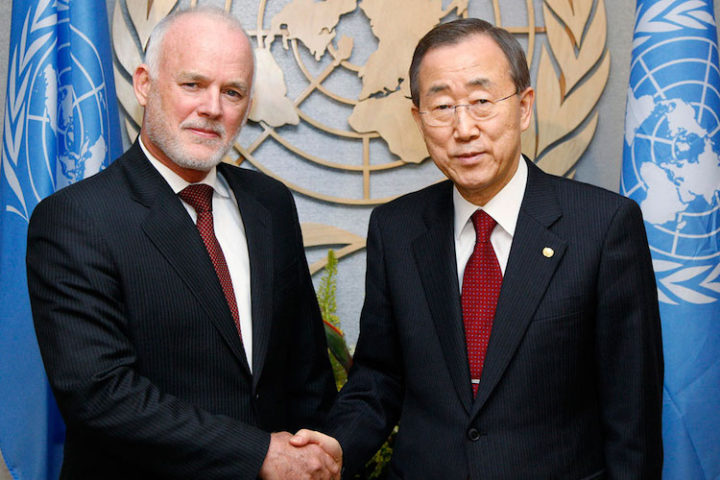By Jaya Ramachandran
NEW YORK | NEW DELHI (IDN) – The implementation of Sustainable Development Goals (SDGs) will top the agenda of Peter Thomson of Fiji who assumes office as President of the 71st session of the UN General Assembly, when it begins on September 13.
In an interview with The Hindu during a visit to New Delhi, Thomson said he had discussed realisation of SDGs in talks with Prime Minister Narendra Modi. “This was the basis for my candidacy, and it will be my utmost effort to ensure that in the 71st session we do whatever we can to get the wheels turning on the SDGs. India and the PGA’s (President of the General Assembly) office will work closely on this.”
He admitted that one of the big challenges is taking the 17 Goals with 169 targets “to the people and educating them, and have them understand that this is something devised for them” – funds for implementation coming partly from the traditional means such the World Bank and the Green Climate Fund.
“The global financial system itself could go down in flames if the SDGs are not implemented. For example, SDG 13 is climate change. The insurance industry won’t be able to function if climate change is not curbed.”
Thomson said he had also discussed with Modi a reform of the UN Security Council (UNSC) and the Comprehensive Convention on International Terrorism (CCIT), which have been hanging fire for several years.
“I was made aware of the sense of frustration that India has on both these counts, but I was able to assure the Prime Minister that the PGA will be seized of both these matters and hopes to take action on both of them,” Thomson told The Hindu on August 31.
He said he was not aware of any member state that was against Security Council reform. “It’s just a question of what kind of reform, what shape the UNSC will take.”
The new UNGA President said he would appoint a chair for intergovernmental negotiations, “and select a citizen or citizens to take it forward”. It was necessary to have all 193 General Assembly members on board, because if there is “a very significant minority that is against the process, we will go nowhere”.
So what he had told Prime Minister Modi was that “I see my role in acting as a catalyst, engaging key players like Italy on the UFC side (Uniting for Consensus, a group of countries opposed to reform), and India on the G4 side (group of applicants which are India, Japan, Germany, Brazil), the P-5 (permanent members of UNSC) and the Group of African countries”.
UFC is a movement, which developed in the 1990s in opposition to the possible expansion of permanent seats in the Security Council. Under the leadership of Italy, it aims to counter the bids for permanent seats proposed by G4 nations and is calling for a consensus before any decision is reached on the form and size of the Security Council. UFC members include: South Korea, Canada, Spain, Mexico, Turkey, Argentina, Pakistan and Malta.
Explaining the idea behind him trip to India that was preceded by that to China, Thomson said: “The reason I chose to come on this trip to China and India is, first of all, they are the two biggest countries in my grouping. Fiji was put forward by the Asia Pacific Group.
“But also because there is a need to finesse and to find a balance on Security Council reform. China is on one side of the argument, and India on the other. Again, everybody speaks of the need for reform, but the question is what the final package will be. Like any other UN process, finding a consensus always seems impossible, until it is done.”
Asked whether there was a need to put a deadline on when the Security Council reform should happen, Thomson said: “The deadline is simply the need for reform and the fact that we are all for reform. When it comes to whether it is delayed or not… I remember what Zhou Enlai said when asked by Henry Kissinger about the impact of the French Revolution. ‘Too early to tell,’ he said. (Kissinger’s translator said later on that Zhou Enlai had been misquoted.)
“Hopefully we won’t have to wait that long for UNSC reform. But the important thing is not the time it takes; the important thing is to get it right and get it done.”
Referring to India’s disappointment about CCIT, which it introduced in 1996, the President of the forthcoming 71st session of the UNGA said: “We certainly will try to get some success on getting the CCIT process under way. I have assured the Prime Minister on this regard. Around the world, terrorism is not going away. It is exacerbating and we have to address it. I as the PGA will be doing everything I can to have the CCIT adopted.” [IDN-InDepthNews – 02 September 2016]
Related article: Climate Change Top Priority of General Assembly’s Fijian President
Photo: Photo: Secretary-General Ban Ki-moon (right) and Ambassador Peter Thomson of Fiji, President-designate of the General Assembly’s 71st session (March 2010). UN Photo/Evan Schneider
IDN is flagship agency of the International Press Syndicate.






